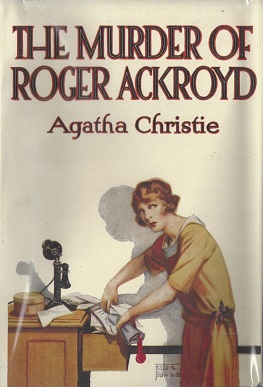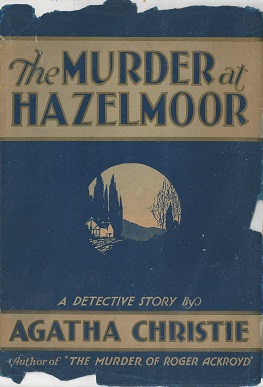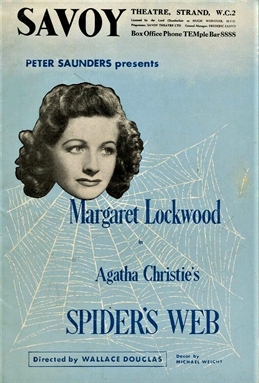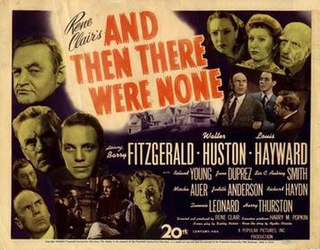
Dame Agatha Mary Clarissa Christie, Lady Mallowan, was a British author known for her 66 detective novels and 14 short story collections, particularly those revolving around fictional detectives Hercule Poirot and Miss Marple. She also wrote the world's longest-running play, the murder mystery The Mousetrap, which has been performed in the West End of London since 1952. A writer during the "Golden Age of Detective Fiction", Christie has been called the "Queen of Crime"—a moniker which is now trademarked by her estate—or the "Queen of Mystery". She also wrote six novels under the pseudonym Mary Westmacott. In 1971, she was made a Dame (DBE) by Queen Elizabeth II for her contributions to literature. Guinness World Records lists Christie as the best-selling fiction writer of all time, her novels having sold more than two billion copies.

Sleeping Murder: Miss Marple's Last Case is a work of detective fiction by Agatha Christie and first published in the UK by the Collins Crime Club in October 1976 and in the US by Dodd, Mead and Company later in the same year. The UK edition retailed for £3.50 and the US edition for $7.95.

The Murder of Roger Ackroyd is a detective novel by the British writer Agatha Christie, her third to feature Hercule Poirot as the lead detective. The novel was published in the UK in June 1926 by William Collins, Sons, having previously been serialised as Who Killed Ackroyd? between July and September 1925 in the London Evening News. An American edition by Dodd, Mead and Company followed in 1926.

The A.B.C. Murders is a work of detective fiction by British writer Agatha Christie, featuring her characters Hercule Poirot, Arthur Hastings and Chief Inspector Japp, as they contend with a series of killings by a mysterious murderer known only as "A.B.C.". The book was first published in the UK by the Collins Crime Club on 6 January 1936, sold for seven shillings and sixpence (7/6) while a US edition, published by Dodd, Mead and Company on 14 February of the same year, was priced $2.00.

The Mirror Crack'd from Side to Side, a novel by Agatha Christie, was published in the UK in 1962 and a year later in the US under the title The Mirror Crack'd. The story features amateur detective Miss Marple solving a mystery in St. Mary Mead.

After the Funeral is a work of detective fiction by Agatha Christie and first published in the US by Dodd, Mead and Company in March 1953 under the title of Funerals are Fatal and in UK by the Collins Crime Club on 18 May of the same year under Christie's original title. The US edition retailed at $2.50 and the UK edition at ten shillings and sixpence (10/6).

Peril at End House is a work of detective fiction by British writer Agatha Christie, first published in the US by the Dodd, Mead and Company in February 1932 and in the UK by the Collins Crime Club in March of the same year. The US edition retailed at $2.00 and the UK edition at seven shillings and sixpence (7/6).

The Mousetrap is a murder mystery play by Agatha Christie. The play opened in London's West End in 1952 and ran continuously until 16 March 2020, when the stage performances had to be temporarily discontinued during the COVID-19 pandemic. It then re-opened on 17 May 2021. The longest-running West End show, it also has by far the longest run of any play in the world, with its 29,500th performance having taken place as of February 2024. Attendees at St Martin's Theatre often get their photo taken beside the wooden counter in the theatre foyer. As of 2022 the play has been seen by 10 million people in London.

The Sittaford Mystery is a work of detective fiction by British writer Agatha Christie, first published in the US by Dodd, Mead and Company in 1931 under the title of The Murder at Hazelmoor and in UK by the Collins Crime Club on 7 September of the same year under Christie's original title. It is the first Christie novel to be given a different title for the US market. The US edition retailed at $2.00 and the UK edition at seven shillings and sixpence (7/6).

Murder Is Easy is a detective fiction novel by Agatha Christie first published in the UK by the Collins Crime Club in June 1939, and in the US by Dodd, Mead and Company in September the same year under the title Easy to Kill. Christie's Superintendent Battle has a cameo appearance at the end, but plays no part in either the solution of the mystery or the apprehension of the criminal. The UK edition retailed at seven shillings and sixpence (7/6), and the US edition at $2.

Towards Zero is a work of detective fiction by Agatha Christie first published in the US by Dodd, Mead and Company in June 1944, and in the UK by the Collins Crime Club in July of the same year. The first US edition of the novel retailed at $2.00 and the UK edition at seven shillings and sixpence (7/6).

A Murder Is Announced is a work of detective fiction by Agatha Christie, first published in the UK by the Collins Crime Club in June 1950 and in the US by Dodd, Mead and Company in the same month. The UK edition sold for eight shillings and sixpence (8/6) and the US edition at $2.50.

Murder at the Gallop (1963) is the second of four Miss Marple films made by Metro-Goldwyn-Mayer. It was based on the 1953 novel After the Funeral by Agatha Christie, with Margaret Rutherford as Miss Jane Marple, Charles "Bud" Tingwell as Inspector Craddock and Stringer Davis as Jane Marple's friend Mr Stringer returning from the previous film.

Agatha Christie: And Then There Were None is a 2005 point-and-click adventure game developed by AWE Productions and published by The Adventure Company for Microsoft Windows. It was the first in The Adventure Company's Agatha Christie series. The game is a detective murder-mystery; it begins with nine people, including Patrick Narracott, the playable character, who meet and journey to the fictional Shipwreck (Soldier) Island. There, two additional onscreen characters are introduced, and the story then follows the events that unfold.

Black Coffee is a play by the British crime-fiction author Agatha Christie which was produced initially in 1930. The first piece that Christie wrote for the stage, it launched a successful second career for her as a playwright. In the play, a scientist discovers that someone in his household has stolen the formula for an explosive. The scientist calls Hercule Poirot to investigate, but is murdered just as Poirot arrives with Hastings and Inspector Japp.

Butter in a Lordly Dish is the name of a half-hour radio play written by Agatha Christie and first performed on the BBC Radio Light Programme on Tuesday 13 January 1948 at 9.30pm on Mystery Playhouse presents The Detection Club. It was repeated on Friday 16 January at 4.15pm.

Star Over Bethlehem is an illustrated book of poetry and short stories on a religious theme by crime writer Agatha Christie. It was published under the name "Agatha Christie Mallowan". It was published in the UK by Collins on 1 November 1965 in an edition priced at thirteen shillings and sixpence (13/6) and in the US by Dodd, Mead and Company in an edition retailing at $4.95.

Spider's Web is a play by crime writer Agatha Christie. Spider's Web, which premiered in London's West End in 1954, is Agatha Christie's second most successful play, having run longer than Witness for the Prosecution, which premiered in 1953. It is surpassed only by Christie's record-breaking The Mousetrap, which has run continuously since opening in the West End in 1952.

And Then There Were None is a 1945 film adaptation of Agatha Christie's 1939 mystery novel of the same name, directed by René Clair. It was released in the United Kingdom as Ten Little Indians, in keeping with the third United Kingdom title of Christie's novel. The film was released by 20th Century Fox and due to the lapsed copyright, it is now in the public domain. The film has been remastered multiple times and is freely available online.

Agatha and the Truth of Murder is a 2018 British alternative history drama film about crime writer Agatha Christie becoming embroiled in a real-life murder case during her 11-day disappearance in 1926. Written by Tom Dalton, it depicts Christie investigating the murder of Florence Nightingale's goddaughter, Florence Nightingale Shore, which is based on real people and events, and how her involvement in this case influenced her subsequent writing.




















